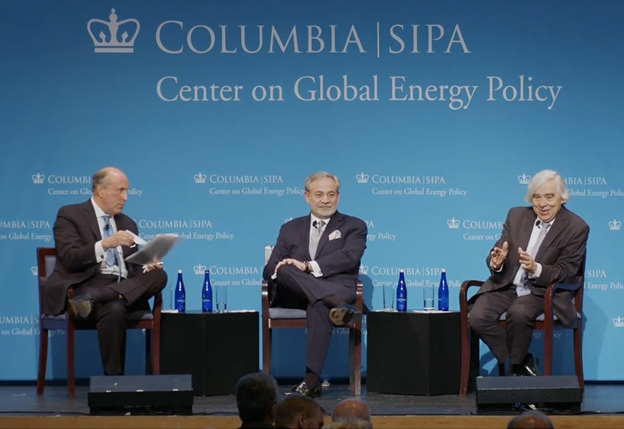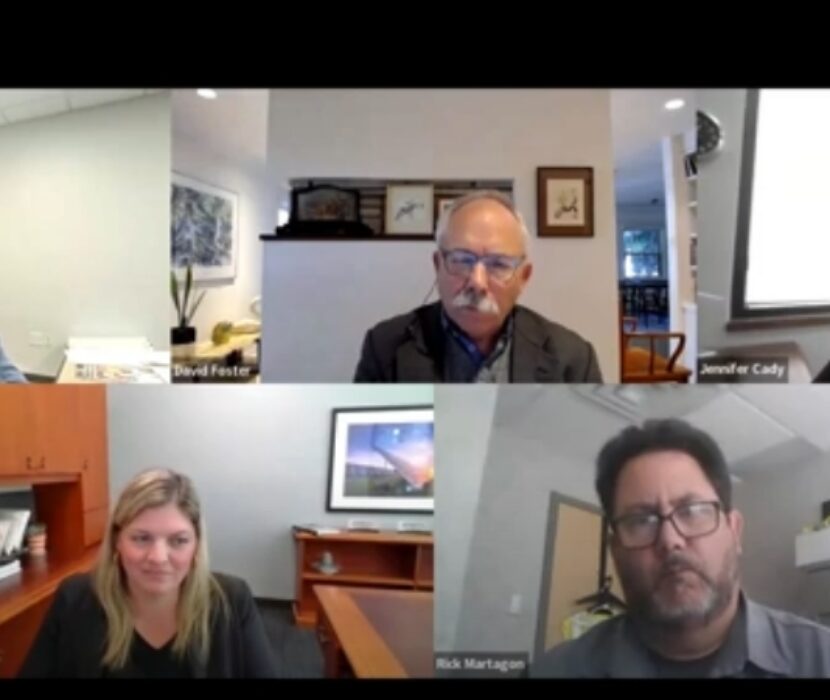
On October 12, former energy secretaries Ernest Moniz and Dan Brouillette shared the stage for a panel discussion at Columbia’s Global Energy Summit 2022 in New York City.
Despite serving under U.S. presidents from different political parties (Barack Obama and Donald Trump, respectively), Moniz and Brouillette agreed on almost all points in the discussion. They both emphasized the need to diversify energy sources and said that as energy secretaries, they both warned Germany of its overreliance on one natural gas supplier (Russia). They also agreed that nations have a collective responsibility to manage energy security, and that energy security goes hand in hand with addressing environmental concerns.
“Climate, energy security, and geopolitics have to be one conversation if we’re going to succeed at all three,” said Moniz, who is CEO of the Energy Futures Initiative (EFI).
Moniz and Brouillette disagreed on whether the energy transition would be additive or involve displacement of existing fuel sources. Brouillette said we will always need more energy and will not fully phase out energy sources. Moniz said there will be displacement of fuels (toward cleaner sources), especially in industrialized nations like the United States that can meet the needs of its citizens without increasing energy supply.
Moniz further gave valuable perspectives on several additional points:
Market Uncertainties: Beyond uncertainties stemming from the war in Ukraine, Moniz said many factors on both the supply and demand sides are creating market uncertainty. Political unrest in Iran and the production of shale and liquefied natural gas have also contributed to supply bottlenecks. Meanwhile, high inflation, the prospect of a recession in the United States, and the potential for China’s government to lift COVID-19 restrictions have made it hard to predict demand.
“Anyone predicting how the supply or demand will go even in the next few months is just throwing a dart at the board and seeing where it lands,” Moniz said.
Continuity in Technology Development: “We have to stay focused on the fact that continuity is important, because it’s really hard to find examples of technologies that have ‘made it’ in less than say 35 years from the early stages to serious deployment,” Moniz said. “That’s just the reality. We do need to improve that timeline, but the reality is I haven’t seen a lot that’s happened to really shorten that time to market.”
Moniz added that despite this long timeline, there has fortunately been a lot of continuity in federal investments; federal research and development programs have not been as disrupted between administrations as some might fear.
Global & Domestic Action: Moniz said what he believes is a positive evolution is the growing recognition of energy security as a collective global responsibility “and not something you discuss just purely at the national level.”
Nonetheless, Moniz called for more action domestically among federal government officials and oil and natural gas CEOs to address uncertainties in a coordinated manner. “I don’t think the right meeting has happened,” he said, emphasizing that while a meeting among stakeholders would not provide instant gratification, it would “begin to move the ball forward.”
He also acknowledged that legislation passed in recent years—the Infrastructure Investment and Jobs Act, CHIPS and Science Act, and Inflation Reduction Act—could help facilitate the energy transition but explained that the implementation of these funds by the U.S. Department of Energy, as part of a coordinated industrial policy, will be the most important factor. “We’ve got a big job to do in making many more clean energy projects bankable/investable,” he said.
To achieve successful, long-term decarbonization, Moniz pointed to the need for electric vehicles, along with petroleum-based hybrid vehicles with “enormous efficiency” in the near term. “I’m all for the strong emphasis on electric vehicles,” he said, “but we can do more than one thing at a time.” He said it is important to have an integrated policy that involves pragmatic actions that often don’t get discussed in addition to the “one shiny object” that tends to get the most attention.
Getting Things Done in Congress: Both former secretaries spoke of ways to successfully structure and negotiate bipartisan energy policy deals. Moniz explained that energy was once more of a regional issue than a partisan issue, but partisanship in energy policy has worsened since the end of the 20th century. He said the blur between regionality and partisanship has made issues even more difficult. However, while success in negotiating deals is hard to do, the formula is not complicated according to Moniz.
“Spend a lot of time with the members of Congress,” Moniz explained, “and not just when you’ve got an issue or when you have a request. You build a relationship, and that just goes an enormous way to having the opportunity to really talk through problems rationally, find the areas of overlap, find the place where you can move the ball….” However, he said to reach a compromise, people have to actually believe that compromise is a good thing, which is something that is not widely accepted today.
Brouillette agreed and added that we are at a starting place for energy policy that is fundamentally different than it once was. He said policymakers used to know the law and policy more deeply than they do now and started with a common understanding that energy is important to the overall economy. From that common goal, they could talk about how to accomplish it. He said they started at the core issues and worked out to the marginal issues, whereas, “today, we start at the margins and try to work our way back to the middle, which is very difficult.” Brouillette said he hopes to get back to the days when energy policy is nonpartisan again.
Positive Developments: Moniz said there are three focal points in the energy technology discussion that have come more sharply into focus:
- No longer only renewables + batteries: “The argument is almost over about wind, solar, and batteries being the answer to everything,” Moniz said. “They are clearly very important to the transition, but the important role of firm power is now firmly entrenched.” He said firm power (long-lasting power that is always available) will be necessary for a decarbonized economy; clean firm power examples are nuclear power and hydrogen, both of which EFI supports.
- Need for a fuel: “The debate is nearly over that electricity alone will do the economywide job, but rather, one needs a fuel,” Moniz said. “Hydrogen is a major focal point today in the discussion,” he said but also emphasized his belief that the low-carbon fuels market is going to be much more “diversified and fragmented by end use than what we see today.” EFI has published reports on hydrogen markets nationally and in three different regions, including the U.S. Gulf Coast.
- Carbon-negative technologies: Moniz said there is a growing consensus that we will need carbon dioxide removal technologies to avert the consequences of climate change. “If you want to reach a net-negative energy economy, you need negative-carbon technologies,” he said. EFI has published a large body of work on carbon dioxide removal, including Clearing the Air, our three Frontiers of CDR reports, and a report kicking off our project efforts to promote carbon capture and storage technology for plant-based fuels.
Read additional coverage on the discussion at Forbes, and on LinkedIn and Twitter.
— Georgia Lyon, Communications Associate
with contributions from Alicia Moulton, Deputy Director of Communications
(Share this post with others.)




